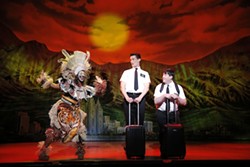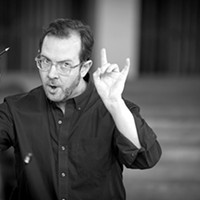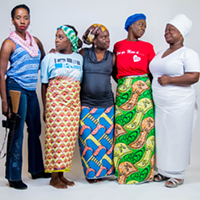The Book of Mormon: Assume the missionary position
Broadway's wicked humor comes knocking
By Perry TannenbaumDefying all the naysayers who scoffed at the idea that Blumenthal Performing Arts would dare to bring it to Charlotte, scandalizing our devout champions who battle against sacrilege and foul language, The Book of Mormon is coming to town — before most pious folks have even thought about taking down their Christmas lights. The smash-hit musical, winner of nine Tony Awards and the crown jewel of Blumenthal's 2013-14 Broadway Lights Series, arrives at Belk Theater this Thursday.
Uncut and uncleansed.
Not only is The Book of Mormon coming, it's staying — booked at the Belk Dec. 26 through Jan. 5 with 16 scheduled performances. That's a pretty impressive stand for a Broadway blockbuster that opened as recently as 2011. Fresh from their engagement in Ft. Lauderdale, we're getting the first U.S. tour cast before they move on to Cincinnati, Atlanta, Durham, Baltimore and Boston.
The filth and irreverence come from an unholy alliance of two great temples of desecration: TV's Trey Parker and Matt Stone, creators of the potty-mouthed South Park, have teamed up with Broadway's Robert Lopez, a co-composer/lyricist in the potty-mouthed Avenue Q. Mormonism moved into the crosshairs of the South Park duo when they aired an "All About the Mormons?" episode in 2003 — the same year that Parker and Stone attended Avenue Q, where Lopez and co-Q-creator Jeff Marx introduced themselves.
Both writing teams, as it turned out, wanted to take a shot at the great American prophet Joseph Smith, the founding father of Mormonism. Seven years later, long after Marx had cut out of the project because of creative differences, all the researching, developing, rewriting and workshops were done. The songs, the lyrics and the book of The Book of Mormon were ready for shipment.
But the story produced by the unholy alliance of Parker, Lopez and Stone was no longer about Joseph Smith. Nor does it merely pit Smith's holy writ against common sense. Instead, it's about two Mormon missionaries and how they grow when religion bumps into reality.
The two young elders are as different as chalk and cheese. Elder Kevin Price is the clean-cut, self-confident, more Romney-esque of the two, always on-script and on-message, while Elder Arnold Cunningham is a rather shambling and insecure specimen of a Mormon, who hasn't gotten around to reading his religion's most sacred book.
We meet Price and Cunningham at the Latter-Day Saints Missionary Training Center in Provo, Utah, in the musical's most familiar song, the bell-ringing "Hello." The trainees are demonstrating the approved script for going door-to-door and drumming up converts. The devout Elder Price is perfect, obviously a star pupil, but Elder Cunningham struggles to stick with the scripted dialogue, conspicuously making up his patter.
This improvisatory bent will cause major complications for both Cunningham and Price down the road. Where will that be? Price presumes that he will face the terrible challenges of Orlando, Fla., in his first missionary assignment, since this is the destination he has prayed for. But no-o-o-o-o-o, Price is dealt two cruel surprises: They're sending him to far-off Uganda and they're pairing him with that dorkiest of screw-ups, Cunningham, who really has no idea where Uganda is.
To say that The Book of Mormon sets up a clash between black and very white probably muddies the issues. Look at any picture of these musical Mormons and you discover the same color-averse uniform repeated over and over, while each of the Ugandans is an individualized walking rainbow. Mormonism doesn't merely clash with Ugandan culture. It's worse than that. As any successful capitalist can tell you — Mitt Romney pops into mind again — you need to be selling what people actually want and need. Price and Cunningham's takeout Mormonism is priced to sell, but in a country torn by war, crippled by poverty and ravaged by AIDS, the life and teachings of Joseph Smith are laughably irrelevant.
What better reason can there be, then, for showing Price make this colossally wrong pitch anyway? If you think it might be hard selling you on the doctrines of the Latter-Day Saints, you can imagine how well Price's "All-American Prophet" goes over with these downtrodden folks — even with a "Donnie Osmond flair."
Rather than merely a snarky take-down of all that's holy in Salt Lake City, the show is actually about two radically divergent cultures becoming acquainted with one another. The Africans aren't any more idealized than the Americans. Compounding their woes, the Ugandans are ruled and terrorized by the soldiers of warlord General Butt-Fucking-Naked, who believes his village's ills can be cured by circumcising all the women in it. Results aren't pretty when Price tries to convert the general.
Nor are the mischief-makers from South Park and Avenue Q trying to make nice in "Spooky Mormon Hell Dream," the bizarre amalgam of acid rock and jazz where Jesus calls Price a dick. Some relatively tender moments crop up in the score when Nabulungi, captivated by Price's preaching, envisions "Sal Tlay Ka Siti," and later, with an unmistakably sexual innuendo, when she and Cunningham duet on "Baptize Me."
There are also unmistakable moments of affirmation, including Cunningham's "Man Up," Price's "I Believe," and the grand finale, "Tomorrow Is a Latter Day." Not to worry: Whether the music grows tender or anthemic, the lyrics will be spiked with some sort of kicker.
And knowing what maggots are — or a clitoris — will never come in handier. These will deepen your understanding of the body of Joseph Smith and the mind of General Butt-Fucking-Naked.
Speaking of...
-
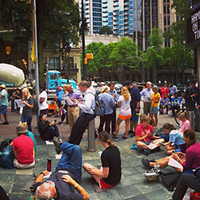
'Hamilton' Arrives This Week, Lifting Local Artists or Eclipsing Them?
Oct 10, 2018 -

Do I Have to Drink to Have a Good Time?
Oct 4, 2017 -
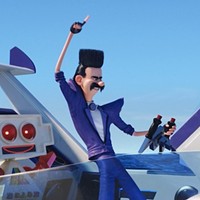
Despicable Me 3: Bad to the bone
Jun 30, 2017 - More »
Latest in Performing Arts
More by Perry Tannenbaum
Calendar
-
I've Had It: Hot S**t Tour @ N.C. Music Factory
-

Open Mic Comedy Nights with Craig Collin @ Carolina Beer Temple.
-

NEW WINDOW GALLERY-Pat Rhea-ACRYLIC PAINTINGS-April 05-30 2024 VALDESE, NC 28690 @ New Window Gallery/Play It Again Records
- Through April 30, 12 p.m.
-
Derek Hough - Symphony Of Dance @ Ovens Auditorium
-

"Blood Residue Analysis of Paleoamerican Stone Tools in the Carolinas" @ Native American Studies Center
- Fri., April 26, 12-1 p.m.

